Farmers growing a regional speciality contemplate a post-Brexit future.
WAKEFIELD, England—
In an open-fronted barn, silver-haired women in sensible shoes and pastel winter coats peruse an array of goods, from chutneys and jams to freshly-picked Yorkshire Forced Rhubarb. E. Oldroyd and Sons, the most famous producer of rhubarb in Britain, hosts regular tours of their ‘forcing’ sheds at their farm in the village of Carlton, Wakefield. Tourists continue to disembark from buses and join the melee. Some take a seat, have a cup of tea, and wait for the person known as the “High Priestess of Rhubarb” to appear.
It’s mid-February in England and, as usual, very little is ready to pick on the nation’s farms. “Forced”—or grown in the dark—rhubarb is a response to the British winter and a result of geographical convenience. Grown in dark, low, heated sheds, forced rhubarb enjoys unseasonal temperatures allowing it to grow quickly, with the lack of light ensuring its unique color and delicate flavor. This out-of-season crop has been a staple in the “rhubarb triangle”—an area of Yorkshire between Leeds, Bradford, and Wakefield—since 1877.
On the Astroturf-covered table separating the crowd from the goods is a sign that declares Yorkshire Forced Rhubarb’s Protected Designation of Origin status. PDO is an EU directive to protect speciality foods from unfair competition and ensure a premium for quality. (It’s why sparkling wine grown outside France’s Champagne region can’t legally be marketed as champagne.) Twenty-five foods and drinks now enjoy its protections and in 2010, Yorkshire rhubarb took its place on the list along with champagne, Serrano ham, and Parmigiano-Reggiano.
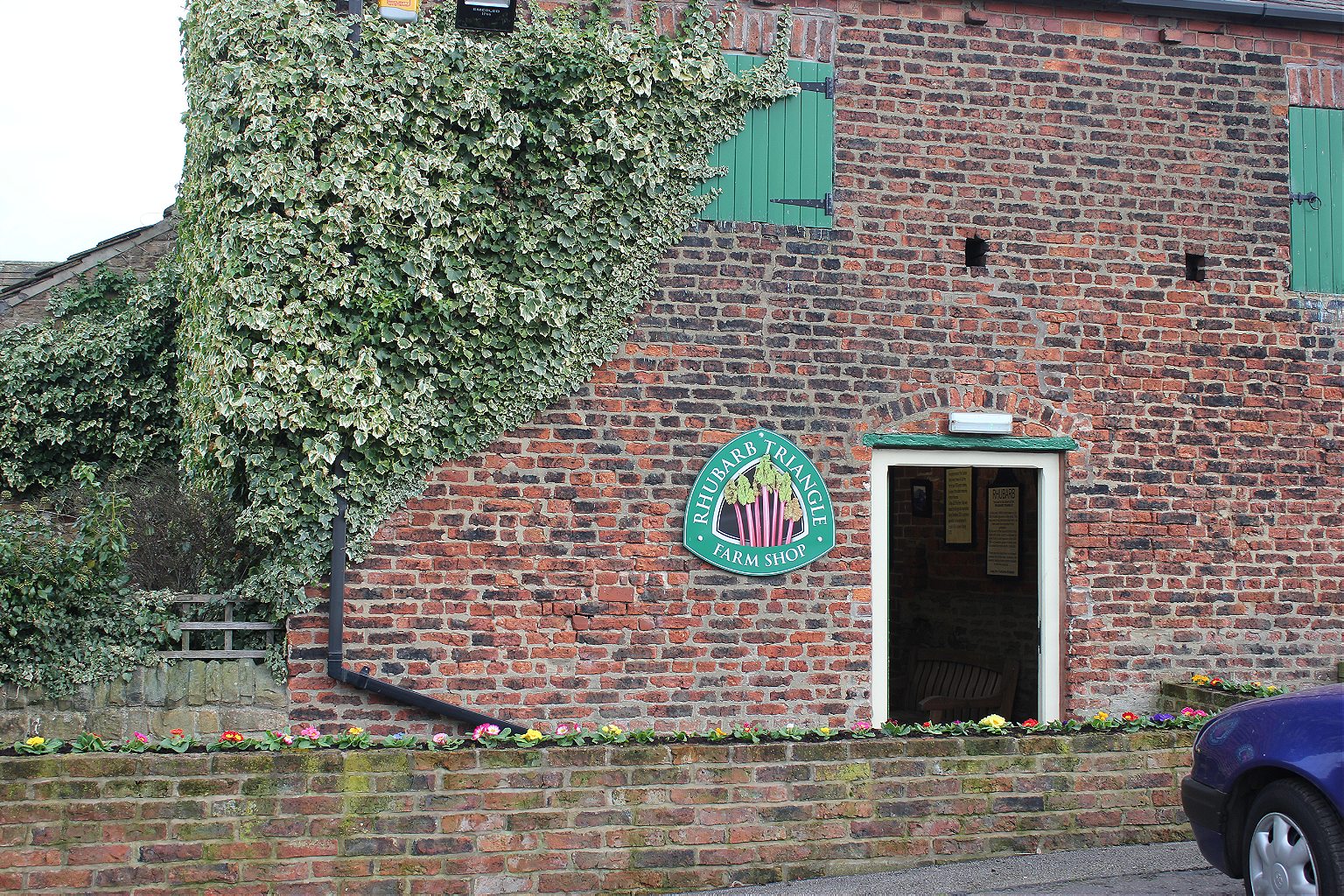
The crowd is herded into a room for a talk from the High Priestess, Janet Oldroyd-Hulme, whispering among themselves as we pass a sign that declares: “Yorkshire Leads the World in Forced Rhubarb Production.” The tourists, mainly members of the Women’s Institute, are seated, and Oldroyd-Hulme launches into a breathless history of rhubarb, from its roots in Siberia to its potential for preventing cancer.
In the darkness of the forcing sheds, tea-lights cast a faint light on a crop of Timperley Early, the first rhubarb variety of the season. It’s a strange, beautiful scene worthy of its stature as a tourist attraction. The bright, tall stems—or petiole sticks—of the plant stand ready for picking despite having never seen the sun. Outdoor rhubarb, which has undergone photosynthesis, loses some of its pink to the green of chlorophyll and becomes more fibrous than its tender, reclusive cousin.
“The candles are for the pickers. Rhubarb is not grown by candlelight, as some journalists say,” says Oldroyd-Hulme, gesturing to candles on tall spikes with a faulty flashlight. While picking at stems that are showing signs of infection or are growing poorly, she talks the crowd through all they need to know, highlighting the root systems that sit atop the soil, carefully dug by hand from the fields outside. We have missed the legendary moment in which you can hear the crop growing: There is an audible ‘pop’ as the stem first bursts away from the root.
Back in the daylight, among these scenes of rural Britain at its twee best, there is huge concern in the countryside following last years’ vote to leave the European Union. Brexit will affect 3,012 agricultural laws, which will fall under review as future negotiations continue. For now, under the terms of ‘The Great Repeal Bill‘, EU laws will be preserved, though EU funding will stop, with the British government has only pledging to match it until 2020. The Common Agricultural Policy currently pays over $3 billion a year to British farmers in the form of subsidies. The CAP has received a lot of criticism and undergone many revisions since its implementation in 1962, but now it’s the British government who must find the money to ensure British farms survive in the face of difficult market conditions.
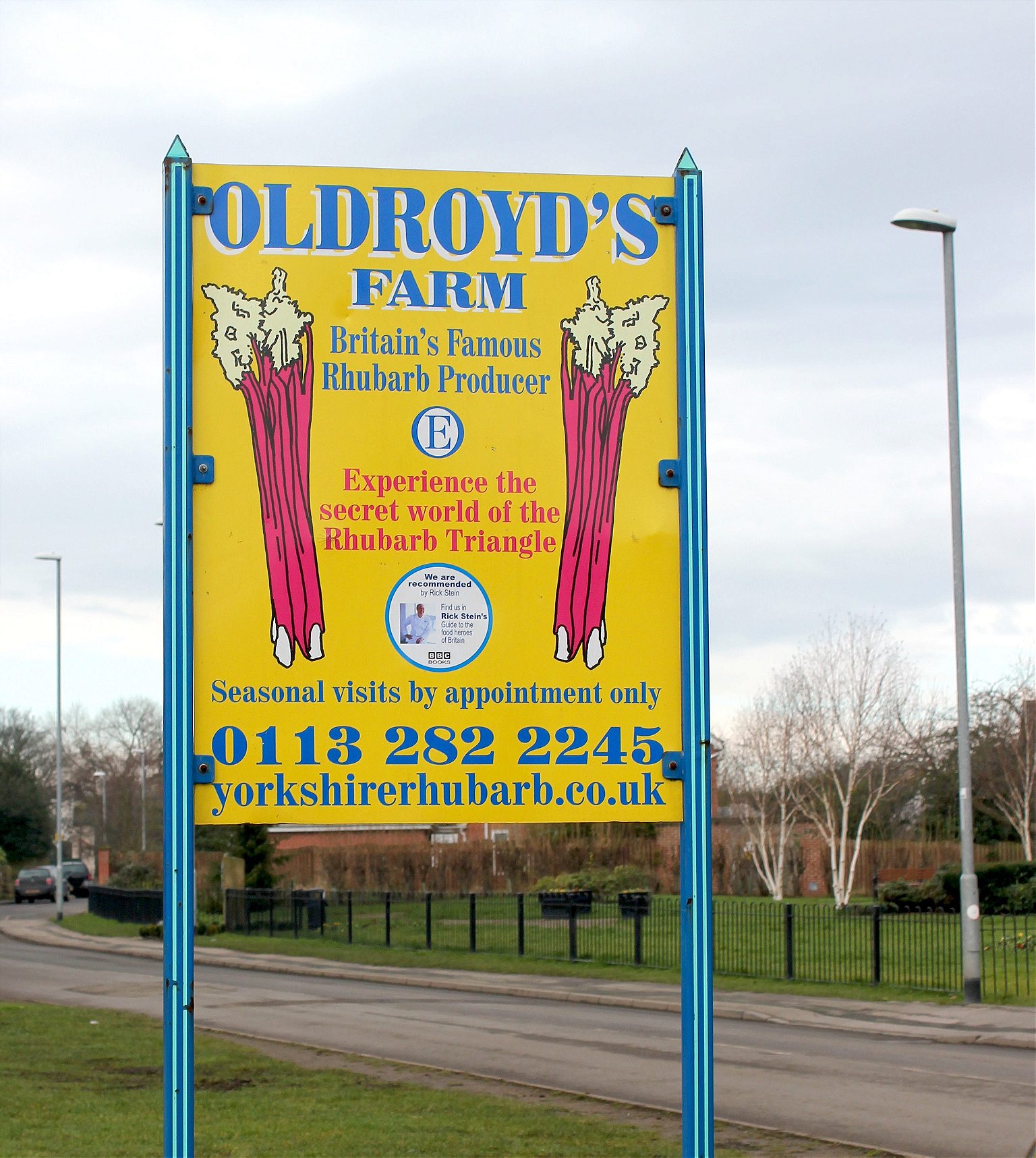
Wakefield is typical of the “Brexit heartlands”: post-industrial towns and cities that have lost their traditional industries. Yorkshire rhubarb production worked because it fed off byproducts of the local industry: waste wool known as “shoddy,” which was used as fertilizer to make nitrogen-rich soil, and cheap fuel from the coalfields that heated the sheds. In 1984, Wakefield had 15 of Yorkshire’s 56 coal mines, most of which didn’t survive the ’80s. It’s these areas that drove support for Brexit, making themselves heard for better or worse.
While nationwide, the vote to leave was just 52 percent, 66 percent of voters in Wakefield, the key point of the rhubarb triangle, wanted out. Yorkshire in general was pro-Leave, with even the more thriving metropolitan area of Leeds showing a 50/50 split.
It may seem counterintuitive that an area with such a strong economic tie to the EU would vote against membership. The rhubarb business, however, isn’t what it was. Only 11 growers are left in the rhubarb triangle and only three have protected status. Some farms that fall inside the geographical region fail to fulfill the technical requirements of what it takes to grow the crop to standard. Only traditional organic feeds such as the shoddy are allowed; use chemical sprays and you’re out.
Oldroyd-Hulme is passionate about these matters. Rhubarb has been in the family for generations. She was an important part of the movement to gain PDO status, but she isn’t worried about the effect of Brexit. “It won’t disappear, that status. I would expect that [the British government is], as we’re asking for, starting up a British food scheme. In acknowledgement of respecting the foods of Europe, Europe will respect ours as well,” she says.
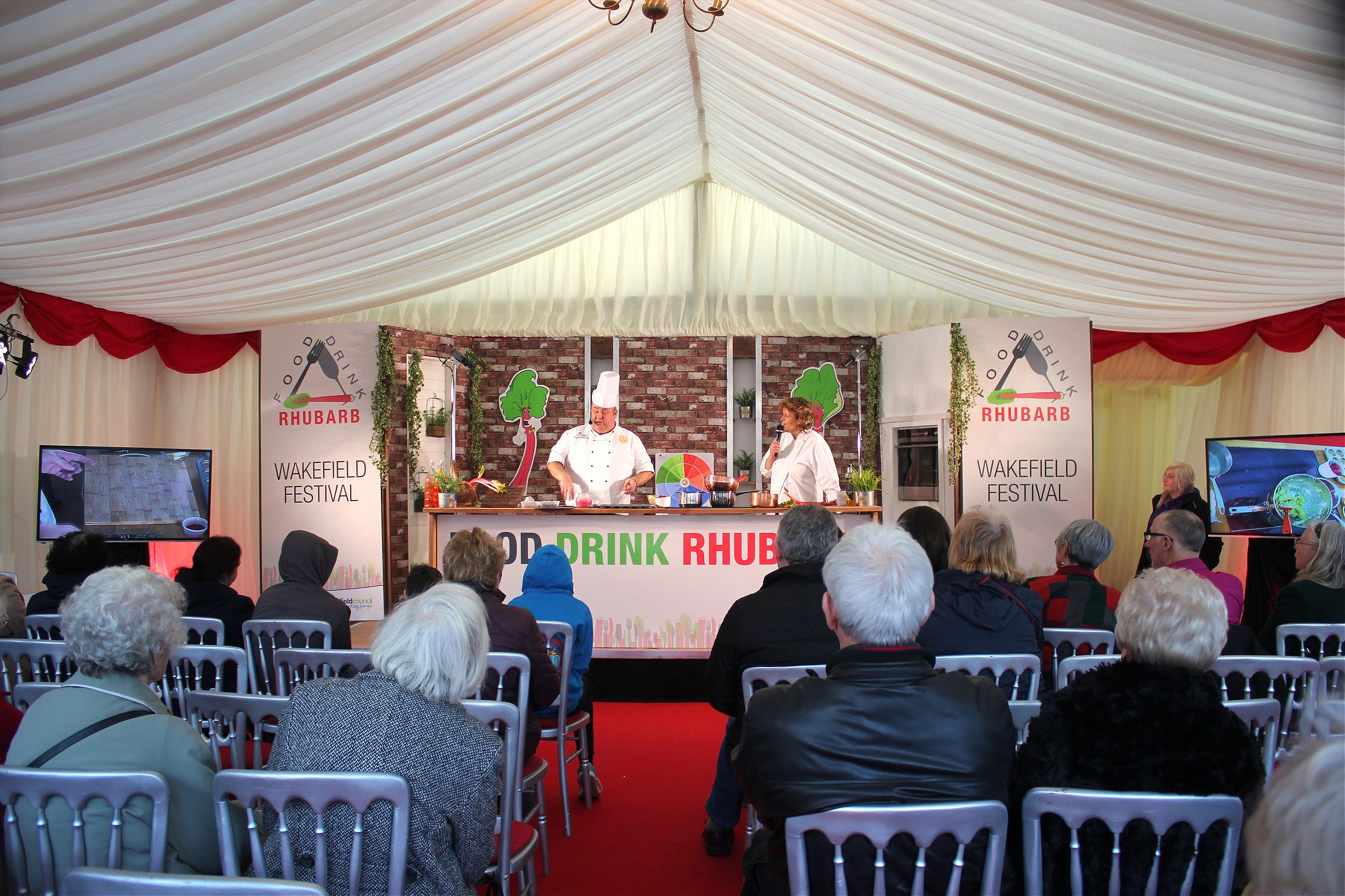
Initially, when the designation was awarded in 2010, Oldroyd-Hulme says that Yorkshire rhubarb growers enjoyed a 20 percent markup on the crop, though the price has since come back down. As with many U.K. businesses, the recent weakness of the pound has also been a problem. If PDO status can be retained, and Yorkshire rhubarb can maintain its special appeal, there’s not too much to worry about in terms of competition from Dutch farms who can’t boast similar heritage with their crops. Even so, with the product being such a speciality and margins so tight, it is vital that British farms like Oldroyd’s get a good Brexit deal.
The bigger problem facing Oldroyd’s, according to Oldroyd-Hulme, is climate change. The rhubarb triangle is perfectly positioned in a “frost pocket” in the shadow of the Pennines, the range of hills and mountains that dominate the landscape of Northern England. A rhubarb root must have seen significant frost before entering the hothouses; this period of dormancy is crucial to the process. If there isn’t enough frost they’d have to apply it artificially, doubling energy costs in a business where margins are already tight, with supermarkets squeezing suppliers in search of profits.
While public opinion remains deeply divided—and largely partisan—around Brexit, some argue that in all of its complexity, the move could be an opportunity to fix a lot of the ills of Britain, particularly when it comes to agriculture. It could even put British farms in a better position to withstand environmental challenges.
Many of those working on innovative projects focused on sustainability see Brexit as an opportunity to improve Britain’s farming practices. The CAP has led to high-profile problems like the 1986 “butter mountain,” when the EU bought 1.23 million tons of unwanted butter at an above-market price. Guaranteed prices and market protections that lead to overproduction have continued to be a problem and the system of farm subsidies is also not without criticism. When recent figures were published showing the recipients of payments from the EU, it appeared that the top earners included the super wealthy and the royal family. The current direct payments system sees landowners receiving payments for owning a lot of land but not necessarily farming it.
Practices that are legal in the U.S. are totally outlawed by the E.U.
The consensus amongst environmental groups such as the Soil Association and People Need Nature is that the break from the CAP represents a chance to reform farming practice and reinvigorate the British countryside. Reports commissioned by Molly Scott Cato, the Green Party MEP for Southwest England, and others revolve around mixed farming, increasing biodiversity, and addressing big issues such as loss of topsoil and supporting farming communities. The policy suggestions make for exciting reading, but it could well be that these voices don’t make it to the negotiating table.
But there could be environmental downsides as well. With talk of a new bilateral trade deal with the U.S., real worries have surfaced about British food standards. Many practices that are legal in the U.S. are totally outlawed by the EU. MP George Eustice, who serves as farming minister within Defra (the Department for Rural Affairs), is on record favoring a U.S. approach of risky, light-touch regulation.
Caroline Lucas, the leader of the U.K. Green Party, recently asked Eustice about his department’s preparations for Brexit, to which he admitted that they hadn’t commissioned any new research in the last six months. Conservative priorities lie elsewhere. It’s already been stated by Prime Minister Theresa May that Britain is leaving the single market, though some exception could be made for financial services, one of Britain’s biggest contributors to GDP.
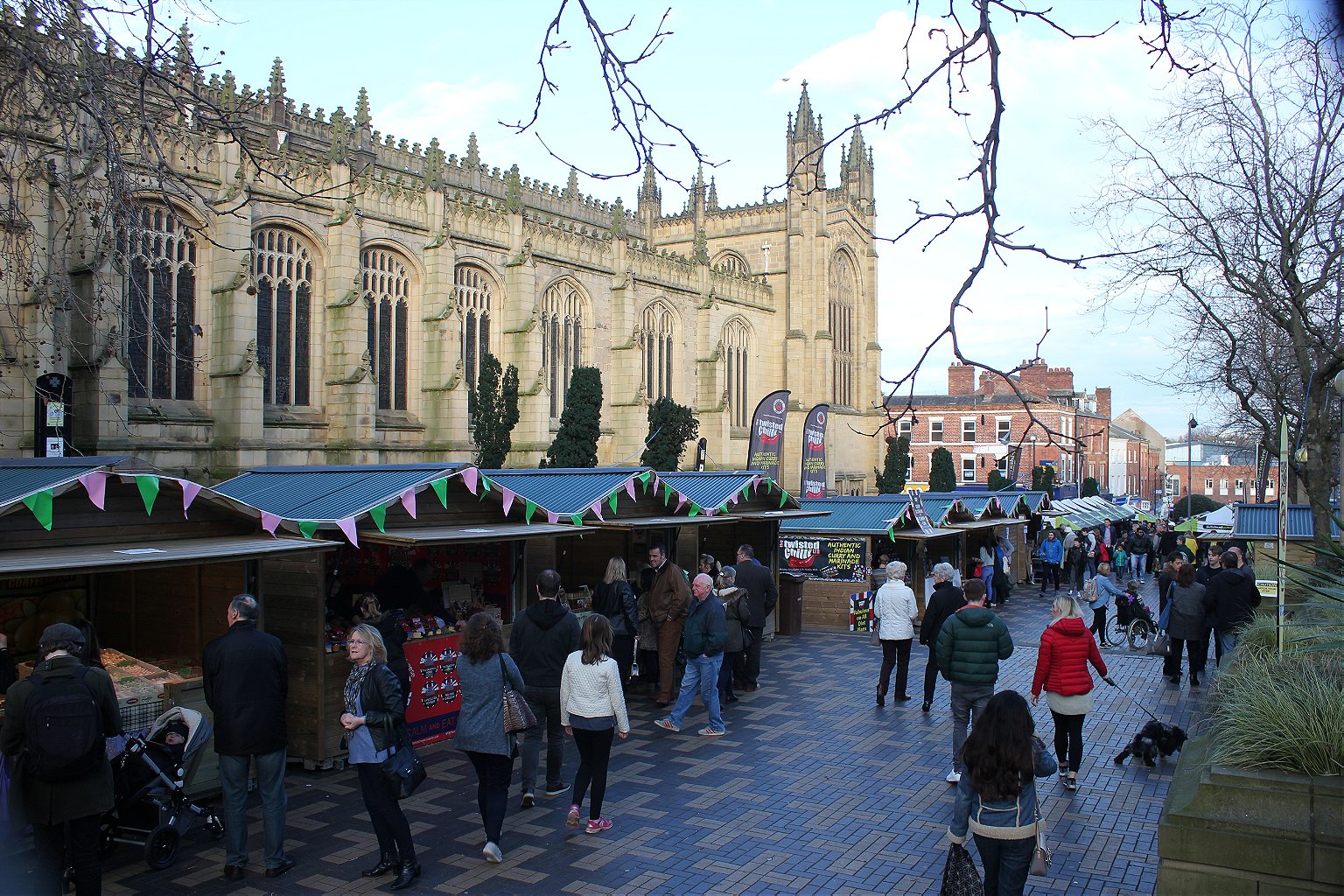
In Wakefield city center in late February, the rhubarb season is celebrated with a food and drink festival on the high street. Judging by the event, Wakefield is thriving. The market is packed and there’s rhubarb in everything from the beer to the pork pies. Brexit seems to be out of the picture here: There are no signs of anything political other than a stall run by a local anti-racism group.
As the less-glamorous neighbor to nearby Leeds, and with a huge maximum-security prison dominating the city, Wakefield has image problems; being home to extremely dangerous prisoners isn’t great for a city’s reputation. But the rhubarb festival, now in its ninth year, is doing a lot to help. The high street is packed with people huddled around the trader’s huts, trying to get their hands on something rhubarb-filled. A hawker hands out samples of Rhucello, a Wakefield-made liquor; chefs on stilts tower over the crowd waving at cameras and children; a bizarre street show of crossdressed old ladies on Segways haunts us at every turn.
A crowd gathers by the cathedral, a beautiful building with history dating back to the 11th century. We break from the action with pints of Rhu Bar Beer—a rhubarb-infused cask ale from nearby brewery Yorkshire Heart—and a rhubarb sausage roll. Pork and rhubarb are a great match, the tartness of the vegetable cutting through the fatty meat. The crowd watches a bride emerge from a car: Guests wait patiently inside while a meticulous photoshoot with the bridesmaids takes place.
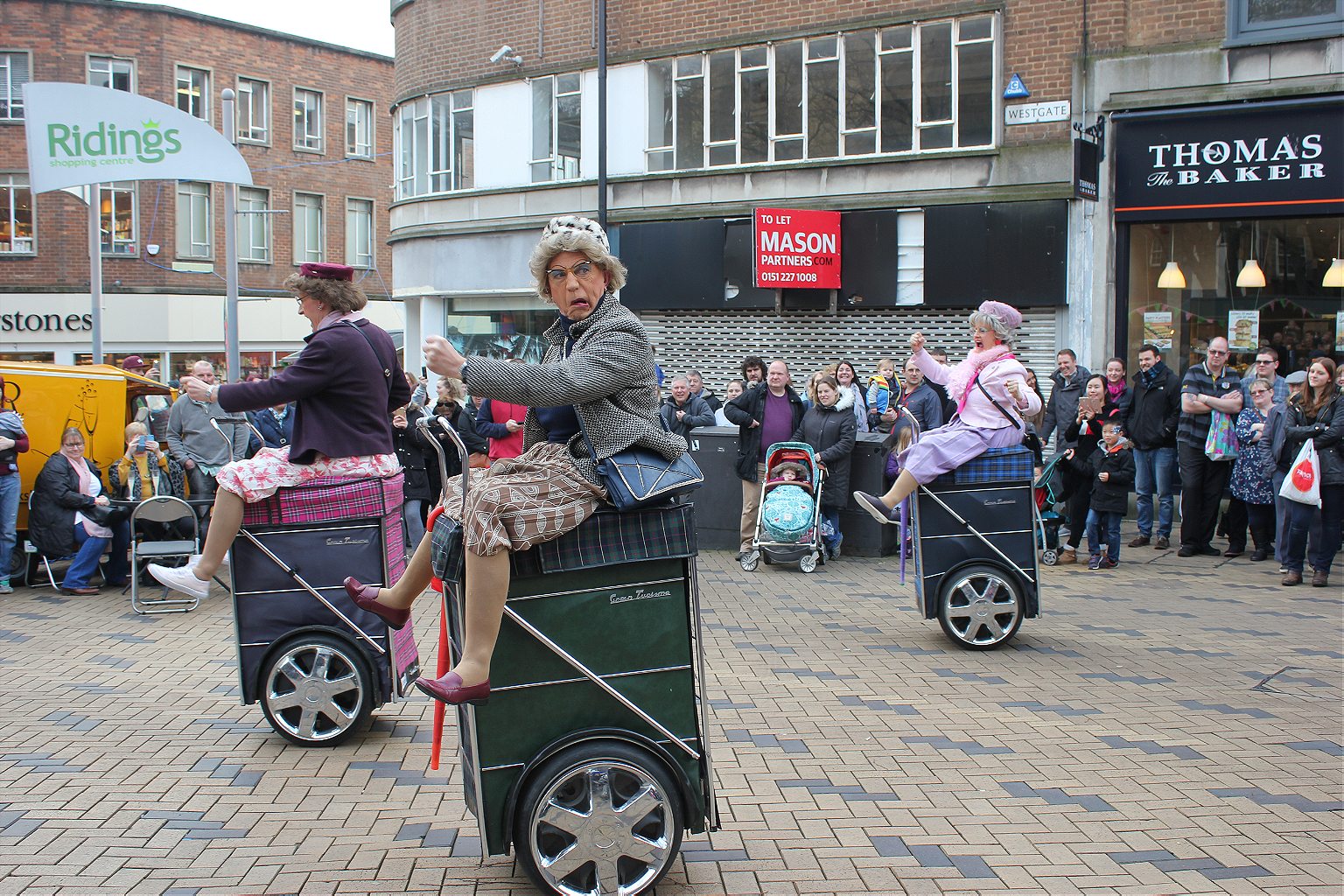
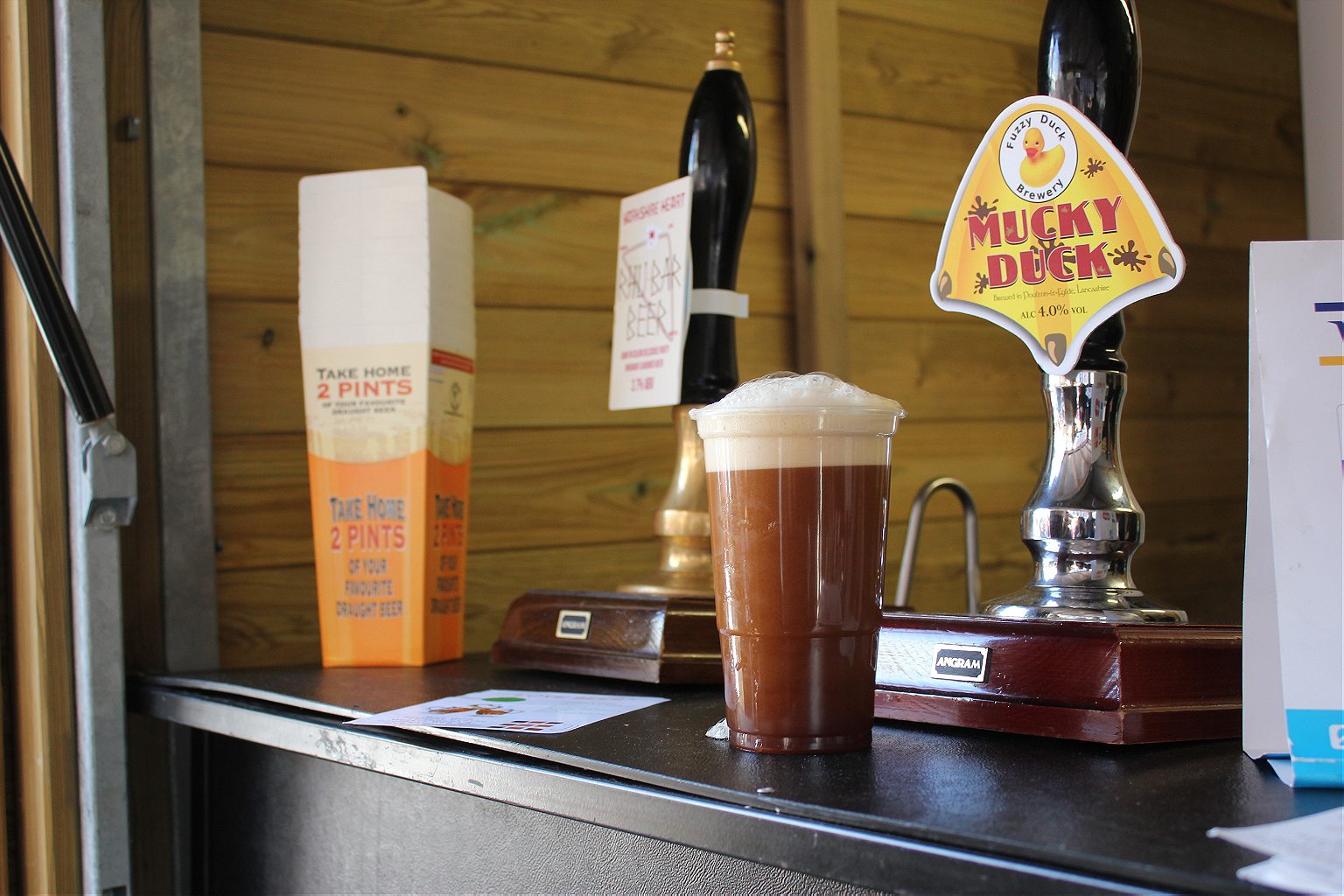
Brexit was, for many, a simple debate on immigration policy that allowed for a binary argument around one of the most important issues of our time. As an island, Britain doesn’t need to build walls, but exiting the EU was largely about ending free movement of Europeans into the U.K. If migration does fall, it’ll be agriculture that is hit hardest. It’s estimated that 30,000 non-U.K. nationals are employed in agriculture, with 67,000 seasonal migrant workers coming in, mainly from Poland and new E.U. member states like Bulgaria and Romania. It is already the case that the weakness of the British pound has affected the lure of the seasonal work; if free movement becomes an issue, there could be a labor shortage.
For people protecting their industry and heritage, there are hard times to come. However, in Wakefield, Oldroyd-Hulme is confident that new negotiations will work out. “I’m not worried. Our food group, people who have gained protected status, is going to have a meeting with the government to sort something out,” she insists.
In the months since the vote, this is the most confident statement I’ve heard from anyone on any Brexit issue, including those charged with negotiating the messy separation.
